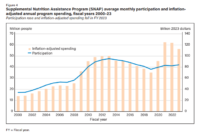Reuters' Karen Braun reported Tuesday that "survey work published by the U.S. Department of Agriculture on Friday showed June 1 U.S. corn stocks at 4.99 billion bushels, a four-year high,…
USDA Cancels July Cattle Report, County Level Estimates
The United States Department of Agriculture announced Tuesday that is canceling the July Cattle report and discontinuing the Cotton Objective Yield Survey and County Estimates for Crop and Livestock beginning with the 2024 production year.
The USDA’s National Agricultural Statistics Service said in a press release that “the decision to discontinue these surveys and reports was not made lightly, but was necessary, given appropriated budget levels.”
Reuters’ Julie Ingwersen reported that “while the USDA will still release a cattle inventory report each January, the July update has been of particular interest to traders in recent years as the U.S. beef cattle herd shrank to its smallest size in decades due to drought.”
“‘Cancelling the July inventory report is a major blow to the livestock sector, who will now be limited to a once-a-year snapshot,’ said Scott Irwin, an agricultural economist at the University of Illinois,” according to Ingwersen’s reporting.
Almost immediately, the announcement received backlash from the National Cattlemen’s Beef Association, who said the reports “provide critical data and the decision to end them is completely misguided.”
“It is disingenuous for the same agency which touts its commitment to transparency in livestock markets to arbitrarily cease publication of reports which provide just that. While it may be politically expedient to blame appropriators in Congress for today’s decision, cattle producers know better than to believe discontinuing a handful of reports will result in substantive cost savings for the Department,” said NCBA Vice President of Government Affairs Ethan Lane in a press release.
Oklahoma State University’s Derrell Peel told Brownfield Ag News that “there’s been a couple of times in the past when USDA has skipped a year and then brought it back. Who knows whether they will consider that again in the future.”
Ingwersen also reported that “the loss of county-level crop data will pose a challenge for commercial grain handlers who rely on the information for planning purposes. The USDA’s decision ‘came as a surprise,’ said Bevan Everett, a risk management consultant with StoneX, a commodities brokerage.”
“‘Our customers, which include processors and cooperatives, depend on those county yields to make business decisions for the season. Those include (grain) storage, origination, and risk strategies,’ Everett said.”
Other Program Changes Recently Announced
The announcement of the program cancellations comes just days after the USDA NASS reported a number of other changes to its other data collection programs, including the reduction of the number of published states for the January Cattle report and the December Hogs and Pigs report. For cattle, the USDA NASS said in a press release that it will “reduce the number of published states for Cattle from 50 states to 31 states, although NASS will publish all cattle and calves inventory, all cows inventory, and calf crop for those 19 states.”
“The 19 states will be Alaska, Connecticut, Delaware, Hawaii, Indiana, Louisiana, Maine, Maryland, Massachusetts, Mississippi, Nevada, New Hampshire, New Jersey, North Carolina, Rhode Island, South Carolina, Utah, Vermont, and West Virginia,” the press release said.
For Hogs and Pigs, the press release said that “NASS plans to reduce the number of published states for December Hogs and Pigs from 50 states to 16 states. The 16
published states will be Colorado, Illinois, Indiana, Iowa, Kansas, Kentucky, Michigan, Minnesota, Missouri, Nebraska, North Carolina, Ohio, Oklahoma, Pennsylvania, South Dakota, and Texas. The 34 non-published states will be accounted for as Other States.”
In addition, the NASS press release said they plan “to reduce the number of published states for quarterly Milk Production from 50 states to 33 states.”






